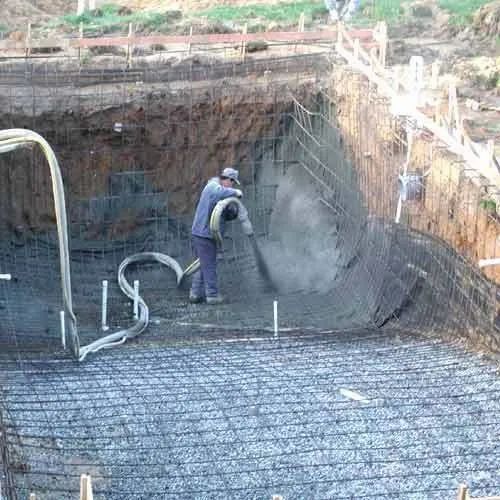
Plumbers are skilled workers who work with water pipes, drains and fixtures in homes, businesses, and factories. Plumbers can do everything from installing and maintaining appliances to replacing and repairing pipes. Plumbers are skilled at cutting holes in walls, ceilings, fittings assembly, and soldering copper and plastic pipes. If you're interested in a career as a plumber, you might want to enroll in a plumbing program offered by a technical school.
There are many factors that can affect the salary of a plumber, such as his skill level, experience and geographic location. The average salary of a plumber in the United States, however, is $86,200 per annum. This figure is based on salary data from the Bureau of Labor Statistics OES Survey. The National Center for Construction Education and Research also provides information.
You must pass a written test and a practical exam in order to become licensed plumber. Further courses are available to earn a master’s degree in plumberry. You are required to complete an apprenticeship program in several states. Although the length of the program may vary, most require at least five years.

An apprenticeship is an on-the-job training program that takes place within a real-world context. An experienced plumber will provide you with on-the job instruction, which can prove to be very beneficial in your learning of how to do your job. After you complete an apprenticeship, your goal is to become a journeyman.
Basic knowledge in science, math, and reading are essential skills to become a plumber. You will also need a high school diploma or a GED. Employers often offer training on the job to help you prepare for your job.
Licensed plumbers are insured and are expected to have a background in local building codes. A license is required by most states before you can work. They must pass a drug and criminal background test. A licensed plumber can expect to work up to forty hours per week.
To be a successful plumber, you'll need to have at least a high school diploma. Higher levels of industry experience and knowledge can make you more. Plumbers often work with sinks or dishwashers.

A Plumber who succeeds will be able find problems in systems and fix them. He will also communicate effectively. Plumbers are also responsible for adjusting pressure levels, fixing leaks, and clearing clogs. You can specialize in different areas depending on your skills.
You can work in a variety of industries and companies. Your salary will vary depending on what company you work for. You can also find work in the manufacturing industry and the hospitality sector. These industries will continue to expand, so more people will need plumbers in future.
The demand for plumbers is increasing because of new homes being built. New home construction is expected to increase by 233,000 jobs over the next 10 years.
FAQ
How much does it take to get building permission?
It varies depending on the state and the complexity of your proposal. It will also depend on whether permission is being sought to build or expand your house. You should expect to wait several months before everything is approved.
Where can I obtain more information about building permits
Ask your local government office (for instance, NSW Local Government Association), or talk to your real estate agent. They will be able to tell you what steps you should take to obtain building permits.
Is there a limit to the amount of money I can spend on the project?
No. No. You might be able to negotiate lower prices with the contractor.
Who creates a Service Agreement
The service agreement between you and your customer defines how you will provide them with services. It details the customer’s responsibilities, what they can do for you, and when they will have to pay.
Additional fees for services may also be confirmed in the service agreement.
All terms and condition of the service agreement should be stated. This includes delivery dates, payment methods, warranties and other terms.
Use this template to ensure that you have covered all the details of your agreement.
Do I need a lawyer to sign my Service Agreements?
No. No. However, you might want to appoint a legal representative as a precautionary measure.
Legal representatives are people who represent another person. You may wish to appoint someone to represent you professionally if you are a contractor.
This could mean hiring a solicitor or accountant. It could also mean someone being appointed to manage your business interests.
The client usually appoints a legal representative. Sometimes, however the vendor hires a legal agent.
In each case, having a legal representation means you are legally protected.
Statistics
- Don't take their anger personally, they are mad about the situation 99% of the time. (activatemylicense.com)
- (1) Ascertain the extent to that offers are based on the payment of overtime and shift premiums; and (2) Negotiate contract prices or estimated costs without these premiums or obtain the requirement from other sources. (acquisition.gov)
- Depending on the client's trustworthiness and financial stability, a deposit is usually 10 to 50% of the total contract amount. (lawdepot.com)
- (3) The contracting officer may provide for a contract price adjustment based solely on a percentage rate determined by the contracting officer using a published economic indicator incorporated into the solicitation and resulting contract. (acquisition.gov)
- (1) Except as provided in paragraphs (a)(4) and (a)(8) of this section, if the estimated amount of the contract or subcontract is $10 million or more, the contracting officer shall request clearance from the appropriate OFCCP regional office before- (acquisition.gov)
External Links
How To
What is the distinction between a contract and a Service Agreement?
A service agreement is an agreement by which a provider agrees that they will provide services to a customer. It creates an obligation between the parties. The term "service" is used to describe a company's products and advice. Financial services are not included.
A contract is an legally binding document that describes the terms and circumstances of a business relationship. If you buy a product directly from a retailer, you've entered into a contractual agreement. You have the right to make payment for the item in due time. When you accept employment, you are entering into a contract.
A service agreement does not require any formal documentation. A service agreement written is not often used in practice. Verbal agreements are the norm.
A service agreement offers many advantages over a contract.
-
A service contract is more flexible that a contract.
-
It allows a service company to change its mind without being penalized.
-
It gives the service greater flexibility in deciding how to deliver the agreed-upon service.
-
It provides clear evidence of what was delivered.
-
It is easier for a service provider to be sued.
-
It is much cheaper to write a service contract than a standard contract.
-
It is less likely to result in litigation.
-
It is more simple to terminate an agreement for service than a contract.
-
It is more simple to amend a service agreement than a standard contract.
-
It is possible to use a service agreement for an ongoing relationship.
-
It is possible to share costs associated with the drafting of a service contract with a third-party.
-
Including a provision requiring arbitration when drafting a service agreement is possible.
-
It is possible to add provisions regarding confidentiality, non-disclosure, proprietary rights, etc.
-
It is possible to specify the duration of the contract (e.g., one year).
-
You can make the service agreement subject only to a pre-existing condition.
-
It is possible to state that the service provider will be liable only for negligence, gross negligence, willful misconduct, or fraud.
-
It is possible, however, to limit liability for consequential losses.
-
It is possible for the service provider and customer to enter into an additional agreement.
-
It is possible to give notice of termination under certain circumstances.
-
You can ask the service provider for a warranty.